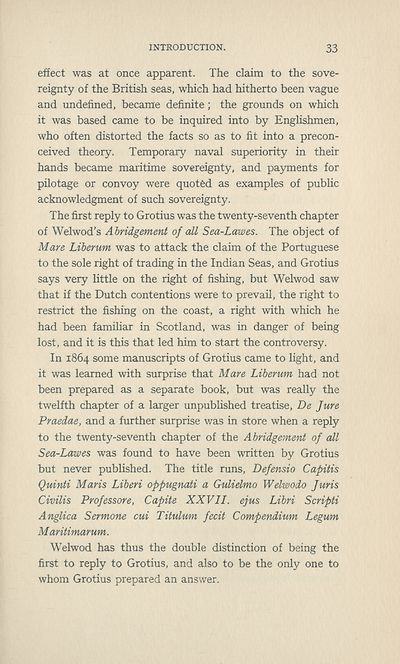Download files
Complete book:
Individual page:
Thumbnail gallery: Grid view | List view

INTRODUCTION.
33
effect was at once apparent. The claim to the sove¬
reignty of the British seas, which had hitherto been vague
and undefined, became definite ; the grounds on which
it was based came to be inquired into by Englishmen,
who often distorted the facts so as to fit into a precon¬
ceived theory. Temporary naval superiority in their
hands became maritime sovereignty, and payments for
pilotage or convoy were quoted as examples of public
acknowledgment of such sovereignty.
The first reply to Grotius was the twenty-seventh chapter
of Welwod’s Abridgement of all Sea-Lawes. The object of
Mare Liberum was to attack the claim of the Portuguese
to the sole right of trading in the Indian Seas, and Grotius
says very little on the right of fishing, but Welwod saw
that if the Dutch contentions were to prevail, the right to
restrict the fishing on the coast, a right with which he
had been familiar in Scotland, was in danger of being
lost, and it is this that led him to start the controversy.
In 1864 some manuscripts of Grotius came to light, and
it was learned with surprise that Mare Liberum had not
been prepared as a separate book, but was really the
twelfth chapter of a larger unpublished treatise, De Jure
Praedae, and a further surprise was in store when a reply
to the twenty-seventh chapter of the Abridgement of all
Sea-Lawes was found to have been written by Grotius
but never published. The title runs, Defensio Capitis
Quinti Maris Liberi oppugnati a Gulielmo Welwodo Juris
Civilis Professore, Capite XXVII. ejus Libri Scripti
Anglica Sermone cui Titulum fecit Compendium Legum
M aritimarum.
Welwod has thus the double distinction of being the
first to reply to Grotius, and also to be the only one to
whom Grotius prepared an answer.
33
effect was at once apparent. The claim to the sove¬
reignty of the British seas, which had hitherto been vague
and undefined, became definite ; the grounds on which
it was based came to be inquired into by Englishmen,
who often distorted the facts so as to fit into a precon¬
ceived theory. Temporary naval superiority in their
hands became maritime sovereignty, and payments for
pilotage or convoy were quoted as examples of public
acknowledgment of such sovereignty.
The first reply to Grotius was the twenty-seventh chapter
of Welwod’s Abridgement of all Sea-Lawes. The object of
Mare Liberum was to attack the claim of the Portuguese
to the sole right of trading in the Indian Seas, and Grotius
says very little on the right of fishing, but Welwod saw
that if the Dutch contentions were to prevail, the right to
restrict the fishing on the coast, a right with which he
had been familiar in Scotland, was in danger of being
lost, and it is this that led him to start the controversy.
In 1864 some manuscripts of Grotius came to light, and
it was learned with surprise that Mare Liberum had not
been prepared as a separate book, but was really the
twelfth chapter of a larger unpublished treatise, De Jure
Praedae, and a further surprise was in store when a reply
to the twenty-seventh chapter of the Abridgement of all
Sea-Lawes was found to have been written by Grotius
but never published. The title runs, Defensio Capitis
Quinti Maris Liberi oppugnati a Gulielmo Welwodo Juris
Civilis Professore, Capite XXVII. ejus Libri Scripti
Anglica Sermone cui Titulum fecit Compendium Legum
M aritimarum.
Welwod has thus the double distinction of being the
first to reply to Grotius, and also to be the only one to
whom Grotius prepared an answer.
Set display mode to: Large image | Zoom image | Transcription
Images and transcriptions on this page, including medium image downloads, may be used under the Creative Commons Attribution 4.0 International Licence unless otherwise stated. ![]()
| Publications by Scottish clubs > Scottish Text Society publications > Third series > Miscellany volume > (45) |
|---|
| Permanent URL | https://digital.nls.uk/106932097 |
|---|
| Description | A collection of over 100 Scottish texts dating from around 1400 to 1700. Most titles are in Scots, and include editions of poetry, drama, and prose by major Scottish writers such as John Barbour, William Dunbar, Gavin Douglas, and George Buchanan. Edited by a key scholarly publisher of Scotland's literary history, and published from the late 19th century onwards by the Scottish Text Society. Available here are STS series 1-3. |
|---|

